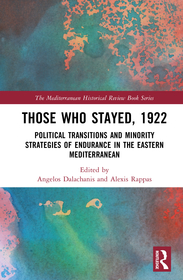
Those Who Stayed, 1922
Political Transitions and Minority Strategies of Endurance in the Eastern Mediterranean
Series: The Mediterranean Historical Review Book Series;
- Publisher's listprice GBP 145.00
-
69 273 Ft (65 975 Ft + 5% VAT)
The price is estimated because at the time of ordering we do not know what conversion rates will apply to HUF / product currency when the book arrives. In case HUF is weaker, the price increases slightly, in case HUF is stronger, the price goes lower slightly.
- Discount 10% (cc. 6 927 Ft off)
- Discounted price 62 346 Ft (59 378 Ft + 5% VAT)
Subcribe now and take benefit of a favourable price.
Subscribe
69 273 Ft

Availability
Estimated delivery time: In stock at the publisher, but not at Prospero's office. Delivery time approx. 3-5 weeks.
Not in stock at Prospero.
Why don't you give exact delivery time?
Delivery time is estimated on our previous experiences. We give estimations only, because we order from outside Hungary, and the delivery time mainly depends on how quickly the publisher supplies the book. Faster or slower deliveries both happen, but we do our best to supply as quickly as possible.
Product details:
- Edition number 1
- Publisher Routledge
- Date of Publication 30 September 2025
- ISBN 9781032792200
- Binding Hardback
- No. of pages236 pages
- Size 234x156 mm
- Weight 600 g
- Language English
- Illustrations 12 Illustrations, black & white; 12 Halftones, black & white 700
Categories
Short description:
The volume uses diverse methodologies—archival research, network analysis, microhistory, and translocal perspectives – to investigate the lived experiences of entrenched minorities.
MoreLong description:
The year 1922 marks a major turning point in Eastern Mediterranean history, with the abolition of the Ottoman Sultanate concluding a long period of upheaval known as the “Eastern Question.” As the empire gave way to European colonization and the nation-state model, its once multicultural societies were homogenized through violence, population transfers, and treaties. The liberal principle of national self-determination often led to devastating human costs, as populations were either massacred, forcibly exchanged, or reduced to “minorities” within new political entities.
While scholarship has thoroughly documented the demographic changes that accompanied the post-Ottoman transition, this volume focuses on a less explored dimension: the agency of those labeled as minorities. It examines how these communities navigated their new reality within emerging nation-states or League of Nations mandates. Adopting a broad and situational understanding of “minority,” it includes both legally defined groups and those marginalized in practice, such as Muslims in Western Thrace, Christians in Istanbul, Armenians in Jerusalem, Muslims in Serbia, and Jews in Salonica.
The volume uses diverse methodologies—archival research, network analysis, microhistory, and translocal perspectives – to investigate the lived experiences of entrenched minorities. It offers new insights into both lesser-known and familiar minority groups, while engaging critically with existing literature. By emphasizing these groups’ strategies and resilience, the volume challenges narratives dominated by violence and nostalgia, offering a more nuanced understanding of post-1922 Eastern Mediterranean history. It will appeal not only to scholars of minority studies but to anyone interested in the region’s modern past.
MoreTable of Contents:
Introduction: Minority Forms of Resilience in the Post-Ottoman World
Part 1: Shifting Grounds for Transient Minorities
Chapter 1
Civilising Mission or Reproduction of the Ottoman Governance? Minorities and Greek Imperial Formation in the Occupied Territories of Trabzon and Smyrna (1916-1922)
Lukas Tsıptsıos
Chapter 2
Catholic Entrenchment, Political Incertitude and Global Relief in Occupied Istanbul (1918-1923)
Gabrıel John Doyle
Part 2: Survival Beyond the State
Chapter 3
Entrenchment of the Armenian Genocide: Memorialisation by the Patriarchate of Jerusalem as Diasporic Identity Politics
Arman Khachatryan
Chapter 4
Enduring a Transition: Cretan Jews in Post-Ottoman Hania
Katerına Anagnostakı
Part 3: Resilience Within the Nation-State
Chapter 5
“Let’s Found the Jewish Secondary School This Year”: A Debate on Schooling and Language in Hellenising Salonika (1926-1928)
Defne Özözer
Chapter 6
The Kingdom of Yugoslavia and Minorities in South Serbia
Klara Volarıc
Chapter 7
Economic Nationalism and Non-Muslims in Early Republican Turkey: The Limitations of Exclusion
Semıh Gökatalay
Epilogue
Language of Politics, Politics of Language
Alexis Wıck
More




